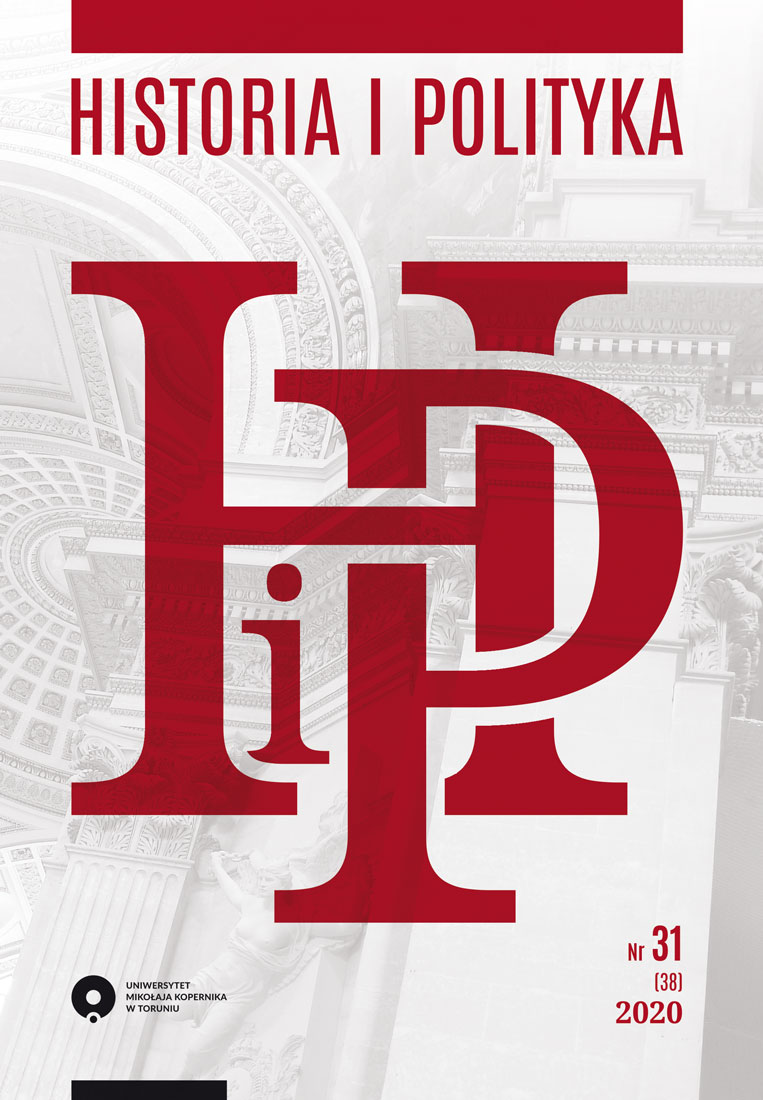O związkach pamięci zbiorowej i polityki zagranicznej. Jad wa-Szem jako przykład wykorzystania traumy Zagłady w dyskursie dotyczącym konfliktu izraelsko-palestyńskiego
DOI:
https://doi.org/10.12775/HiP.2020.007Keywords
Zagłada, konflikt izraelsko-palestyński, Jad wa-Szem, pamięć zbiorowa, polityka historycznaAbstract
Adopting a new materialist perspective, the article analyzes the exhibition offered by the historical museum of Yad Vashem in Jerusalem to commemorate Shoah. It aims at exposing the subtle references the exhibition makes to the Israeli-Palestinian conflict. The argumentation reveals the multiple ways in which official strategies of remembering the traumatic past are shaped by contemporary discourses or political challenges, placing emphasis on the important intersections of historical policy and current political ventures.
References
Barad, K. (2003). Posthumanist Performativity: Toward an Understanding of How Matter Comes to Matter. Signs: Journal of Women in Culture and Society, 28(3), 801–831.
Barad, K. (2007). Meeting the Universe Halfway: Quantum Physics and the Entanglement of Matter and Meaning. Durham: Duke University Press.
Boivin, N. (2008). Material Cultures, Material Minds: The Impact of Things on Human Thought, Society, and Evolution. Cambridge: Cambridge University Press.
Braidotti, R. (2000). Teratologies. W: I. Buchanan, C. Colebrook (red.). Deleuze and Feminist Theory (ss. 156–172). Edynburg: Edinburgh University Press.
Braidotti, R. (2002). Metamorphoses: Towards a Materialist Theory of Becoming. Cambridge: Polity Press.
Braidotti, R. (2006). Transpositions: On Nomadic Ethics. Cambridge: Polity Press.
Caruth, C. (1995). Trauma and Experience: Introduction. W: C. Caruth (red.). Trauma: Explorations in Memory (ss. 3–12). Baltimore i Londyn: Johns Hopkins University Press.
Caruth, C. (1996). Unclaimed Experience: Trauma, Narrative, and History. Baltimore i Londyn: Johns Hopkins University Press.
DeLanda, M. (1996). The Geology of Morals: A Neo-Materialist Interpretation. Pobrane z: http://www.t0.or.at/delanda/geology.htm.
DeLanda, M. (2006). A New Philosophy of Society: Assemblage Theory and Social Complexity. Londyn i Nowy Jork: Continuum.
Golańska, D. (2016). Importing Trauma/Reclaiming the “Wild”: Holocaust Memory in the US. W: J. Kamionkowski, J. Partyka (red.). American Wild Zones. Space, Experience, Consciousness (ss. 41–57). Nowy Jork i Frankfurt nad Menem: Peter Lang.
Graham, B. (2002). Heritage and Knowledge: Capital or Culture?, Urban Studies, 39, 1003–1017.
Grosz, E. (1994). Volatile Bodies. Toward a Corporeal Feminism. Bloomington and Indianapolis: Indiana University Press.
Grosz, E. (2008). Chaos, Territory, Art: Deleuze and the Framing of the Earth. Nowy Jork: Columbia University Press.
Gutwein, D. (2009). The Privatization of the Holocaust: Memory, Historiography, and Politics. Israel Studies, 14(1), 36–64.
Haraway, D. (1988). Situated Knowledges. The Science Question in Feminist and the Privilege of Partial Perspective. Feminist Studies, 14(3), 575–599.
Hirsch, M. (1997). Family Frames. Photography, Narrative and Postmemory. Cambridge, MA: Harvard University Press.
Hirsch, M. (2008). The Generation of Postmemory. Poetics Today, 29(1), 103–128.
Hirsch, M. (2012). The Generation of Postmemory. Writing and Visual Culture After the Holocaust. Nowy Jork: Columbia University Press.
Knudsen, B.T. (2006). Emotional Geography: Authenticity, Embodiment and Cultural Heritage. Ethnologia Europaea/Journal of European Ethnology, 36(2), 5–25.
Latour, B. (2010) Splatając na nowo to, co społeczne. Wprowadzenie do teorii aktora-sieci. Kraków: Universitas.
Logan, W., Reeves, K. (2009). Introduction: Remembering Places of Pain and Shame. W: W. Logan, K. Reeves (red.). Places of Pain and Shame: Dealing with “Difficult Past” (ss. 1–14). Londyn: Routledge.
Macdonald, S. (2006). Undesirable Heritage: Fascist Material Culture and Historical Consciousness in Nuremberg. International Journal of Heritage Studies, 12(1), 9–28.
Macdonald, S. (2013). Memorylands. Heritage and Identity in Europe Today. Nowy Jork: Routledge.
Massumi, B. (2002). Parables for the Virtual. Durham, NC: Duke University Press.
Massumi, B. (2011). Semblance and Event: Activist Philosophy and the Occurrent Arts. Cambridge: MIT Press.
Message, K. (2006). New Museums and the Making of Culture. Oxford: Berg.
Ockman, J. (2006). A Place in the World for a World Displaced. W: J. Ockman, M. Safdie, A. Ahlev, E. Wiesel, Yad Vashem. Moshe Safdie—the Architecture of Memory. Jerozolima: Yad Vashem Publications.
Shalev, A. (2006). Building a Holocaust Museum in Jerusalem. W: J. Ockman, M. Safdie, A. Ahlev, E. Wiesel, Yad Vashem. Moshe Safdie—the Architecture of Memory (ss. 50–60). Jerozolima: Yad Vashem Publications.
Smith, L. (2004). Archeological Theory and the Politics of Cultural Heritage. Londyn: Routledge.
Sontag, S. (2003). Regarding the Pain of Others. Londyn: Penguin.
Tunbridge, J.E., Ashworth, G.J. (1996). Dissonant Heritage. The Management of the Past as a Resource in Conflict. Chichester: Wiley.
Uzzell, D.L., Ballantyne, R. (1998). Heritage that Hurts: Interpretation in a Postmodern World. W: D.L. Uzzell, R. Ballantyne (red.). Contemporary Issues in Heritage and Environmental Interpretation (ss. 152–171). London: The Stationery Office.
Van der Kolk, B.A., Van der Hart, O. (1995). The Intrusive Past: The Flexibility of Memory and the Engraving of Trauma. W: C. Caruth (red.). Trauma: Explorations in Memory (ss. 158–182). Baltimore, MD: Johns Hopkins University Press.
Violi, P. (2012). Trauma Site Museums and Politics of Memory: Tuol Sleng, Villa Grimaldi and the Bologna Ustica Museum. Theory, Culture & Society, 29, 36–75.
Williams, P. (2007). Memorial Museums: The Global Rush to Commemorate Atrocities. Oxford/New York: Berg.
Young, J.E. (1993). The Texture of Memory: Holocaust Memorials and Meaning. New Haven: Yale University Press.
Yuval-Davis, N. (1997). Gender & Nation. Londyn: Sage.
Zerubavel, Y. (1994). The Death of Memory and the Memory of Death. Masada and the Holocaust as Historical Metaphors. Representations, 45, 72–100.
Downloads
Published
How to Cite
Issue
Section
License
Nicolaus Copernicus University fully respects the right to privacy and protection of personal data of all authors. The authors’ personal data is not used for commercial and/or marketing purposes.Stats
Number of views and downloads: 392
Number of citations: 0



